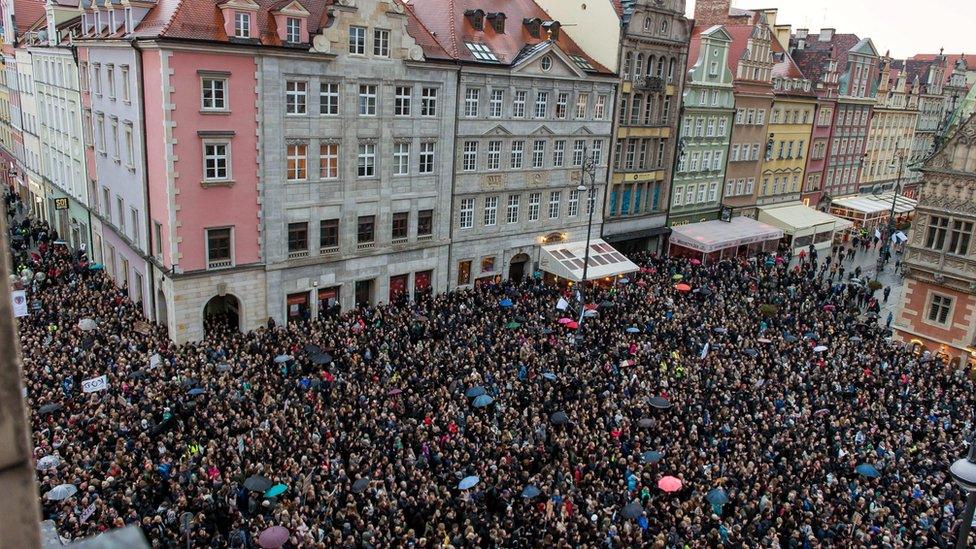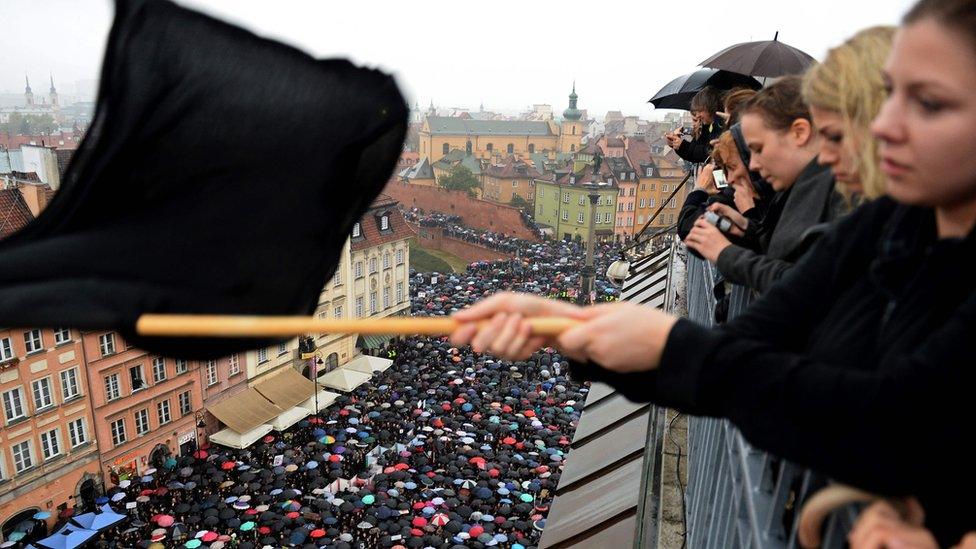Poland abortion: Deputy PM backs away from ban
- Published

Thousands turned out in Wroclaw on Monday to protest against the proposed near-total ban of abortion
Polish Deputy Prime Minister Jaroslaw Gowin has said proposals put before parliament for a near-total ban on abortion will not be implemented.
A citizens' bill backed by the Catholic Church aims to ban all abortions unless the mother's life is at risk.
State-run radio quoted Mr Gowin as saying that a nationwide protest on Monday against the proposals had given the government "food for thought".
Prime Minister Beata Szydlo has also distanced the government from the bill.
"I want to state very clearly that the PiS [Law and Justice] government is not working on any legislation changing the rules on abortion in Poland," Ms Szydlo told a news conference on Tuesday.
The bill came from an anti-abortion citizens' initiative that gathered some 450,000 signatures.
'Food for thought'
Poland's socially conservative government has a majority in parliament but the bill is not sponsored by the government and all MPs will have a free vote.
The deputy prime minister told Radio Koszalin in northern Poland that the current abortion exceptions would remain.
"I want to reassure those who fear that in Poland abortion will be completely prohibited," he said.
"A total ban certainly won't get through. Abortion will certainly not be banned when the woman is the victim of rape or if her life or her health is in danger," he added.
He said Monday's protest "gave us food for thought and certainly taught us humility", in an interview hours before the European Parliament was due to discuss the Polish proposals.


The government softens its stance - Adam Easton, BBC News, Warsaw
Poland's foreign minister, Witold Wasczykowski, belittled Monday's nationwide protest, calling it marginal and making a mockery of important issues.
But faced with such widespread opposition, Poland's governing right-wing Law and Justice party, has softened its stance.
It has also dropped a plan to write its own bill that would further restrict the country's abortion law.
It seems likely that the current 23-year-old compromise, which only allows the procedure in cases of rape or incest, or when the health of the mother or foetus is endangered, will remain in place.

On Monday, 100,000 women took to the streets of the capital city, Warsaw, as well as in Gdansk, Lodz, Wroclaw, Krakow and elsewhere in the mostly Catholic nation.
Demonstrations were also held in solidarity in other European cities, including Berlin, Brussels, Duesseldorf, Belfast, London and Paris.
If the citizens' bill is passed, abortion would only be possible if the woman's life were in danger. Women found to have had abortions would be punished with a five-year prison term. Doctors found to have assisted in an abortion would also be liable for jail time.
A recent Ipsos opinion poll suggests the vast majority of Poles do not want a more restrictive abortion law, with only 11% favouring that option.
Almost half said that existing legislation should remain unchanged, while more than a third said abortion should be more widely available.
Even by conservative estimates there are far more illegal than legal abortions in Poland - between 10,000 and 150,000, compared with about 1,000 or 2,000 legal terminations.
- Published6 October 2016
